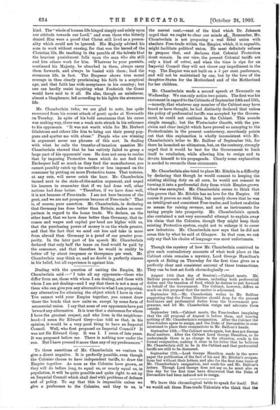Mr. Chamberlain - (who, we are glad to note, has
quite recovered from his recent attack of gout) spoke at Newcastle on Tuesday. In spite of his bold assurances that his cause was making way, there was a weak note struck in his reference to his opponents. "It was not worth while for Mr. Herbert Gladstone and others like him to bring out their penny pop- guns and spatter me with abuse." People who are winning in argument never use phrases of this sort. In dealing with what he calls the transfer-of-taxation question Mr. Chamberlain showed that he has entirely failed to grasp a large part of his opponents' case. He does not seem to realise that by imposing Protective taxes which do not feed the Exchequer half so much as they feed the manufacturer, you cannot possibly catch up the sacrifice or loss imposed on the consumer by putting on more Protective taxes. That tortoise, at any rate, will never catch the hare. Mr. Chamberlain turned next to the state-of-the-nation argument, and urged his bearers to remember that if we had done well, other nations had done better. "Therefore, if we have done well, ' it is not because of Free-trade. I am not here because of the gout, and we are not prosperous because of Free-trade." That is, of course, pure assertion. Mr. Chamberlain, in declaring that Germany has done better than Britain, makes no com- parison in regard to the home trade. We declare, on the other hand, that we have done better than Germany, that in- comes and wages and capital per head are higher with us, that the purchasing power of money is on the whole greater, and that the fact that we send out less and take in more from abroad than Germany is a proof of our greater pros- perity. In the later part of his speech Mr. Chamberlain declared that only half the taxes on food would be paid by the consumer, and that therefore he would in reality be better off by about twopence or threepence per week. Mr. Chamberlain may think so, and no doubt is perfectly sincere in his belief, but all experience is against him.






















































 Previous page
Previous page